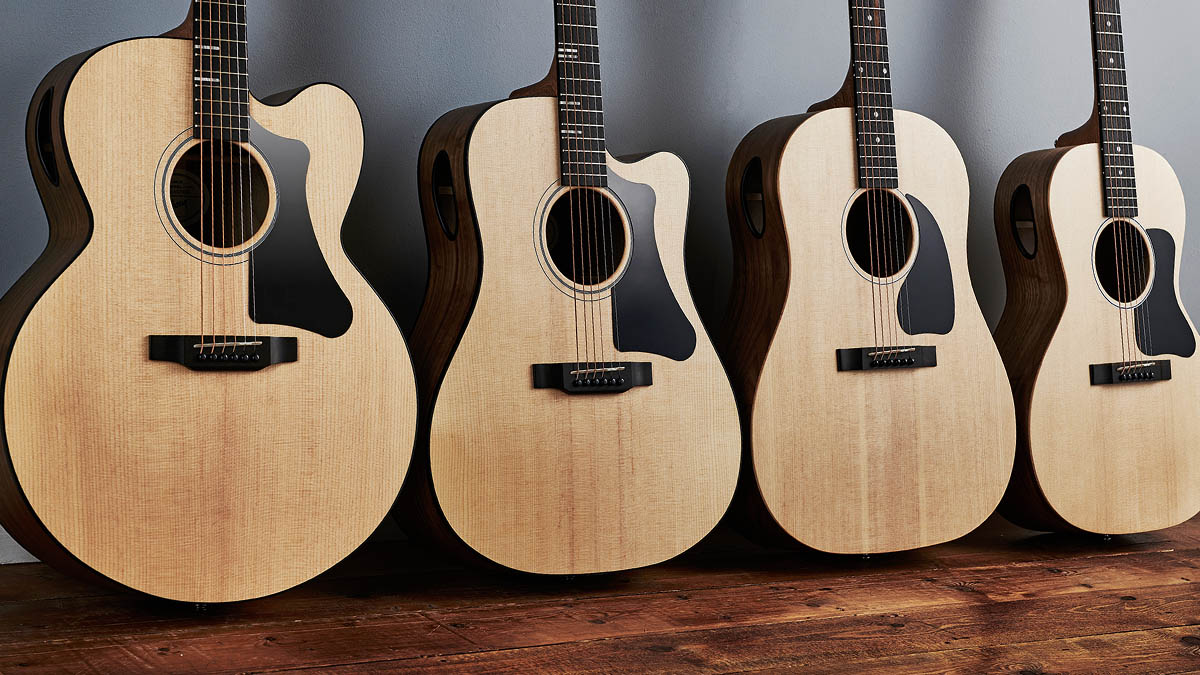MusicRadar Verdict
The Gibson Generation Collection’s clean designs, great tones and playability make for a compelling range of forward-thinking instruments that make US-built acoustics more affordable than ever.
Pros
- +
Classy contemporary updates of Gibson classics.
- +
Player Port enhances player's appreciation of the sound.
- +
Nice neck shape.
Cons
- -
No hard case.
- -
No Pickup options for the G-00 and G-45.
MusicRadar's got your back
Gibson Generation Collection: What is it?
From a certain remove, the Generation Collection is a quietly revolutionary move for Gibson’s acoustic guitar lineup. There are four models in the series; the jumbo cutaway G-200 EC and dread cutaway G-Writer EC, both equipped with LR Baggs electrics, and the parlour-sized G-00 and dreadnought G-45, both without.
The headline item on their spec is the much-vaunted Player Port – a soundhole mounted on the top-side of the instrument to give the player the ‘best seat in the house’.
But with these acoustics all-solid wood and made in Gibson’s Bozeman, Montana facility, yet retailing for prices that are far more accessible than their counterparts, they would be big news even before you factor in this new design. Indeed, the Original Series J-45 is almost three times the price of the G-45. That’s a considerable saving.
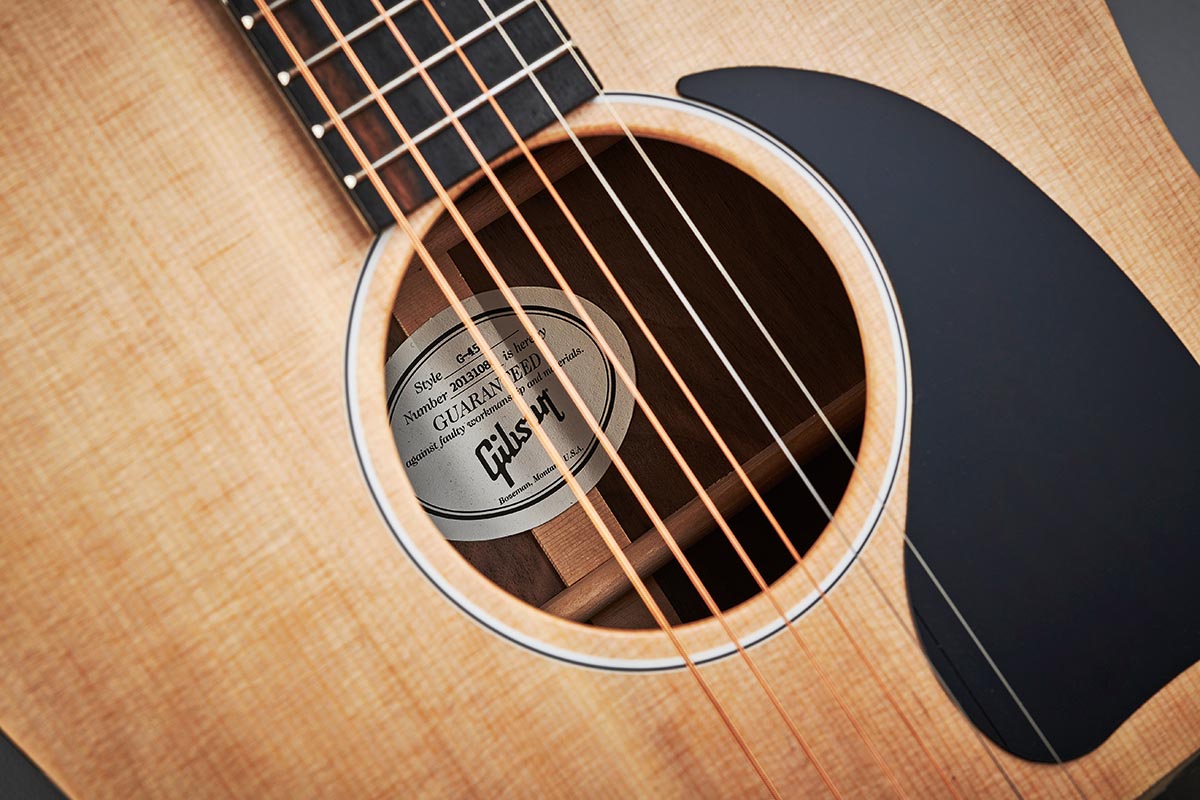
If the Generation Collection is indeed a revolutionary manoeuvre from the Nashville-based brand, its development can be traced back to the ‘60s and a discarded idea from Gibson über-designed Ted McCarty, who originally envisaged the Player Port being augmenting the J-45. Well, sometimes even the best ideas have to wait their turn.
Each guitar in the collection arrives in a muted Natural open-pore finish, with Sitka spruce on top supported by scalloped X-pattern bracing, and walnut back and sides. Gibson has used utile for the necks.
A mahogany variant, utile is, well, a mahogany variant, and on a neck such as this, it is going to take a devout cork sniffer to notice the difference. Either way, it is carved into Gibson’s Advanced Profile neck shape, is glued to the body with hot hide glue, and in the hand, it feels like an accommodating C profile.
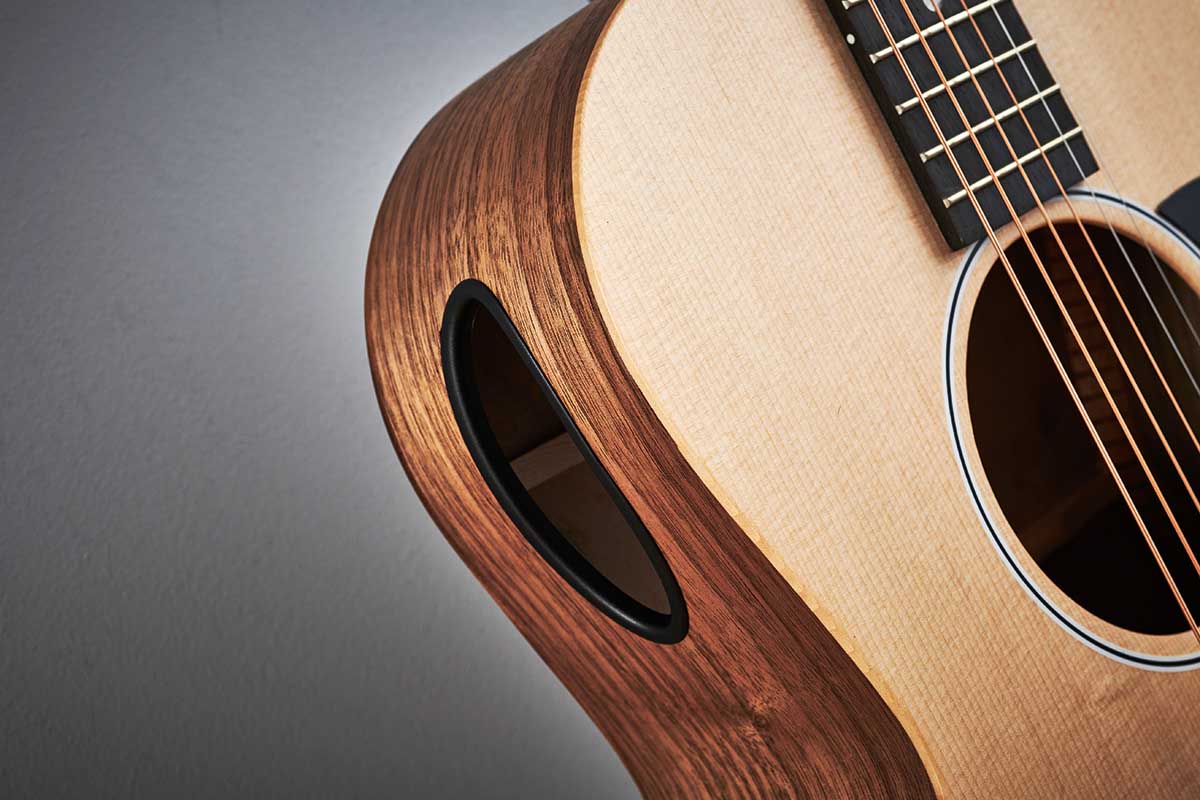
Gibson has used striped ebony for the fingerboards, which is most definitely always ebony in feel but your mileage may vary regarding how striped you find your model’s fingerboard, or indeed your bridge, with Gibson using striped ebony again for the archtop bridge.
Elsewhere, there are chrome Mini Rotomatic tuners, Graph Tech Tusq nuts and saddles, 20 frets and each model conforms to Gibson’s favourite 24.75” scale length.
As for the other dimensions, the collection is a moveable feast. The G-00 is inspired by the classic L-00 body shape. It’s parlor-sized, and that perhaps makes it a potential travel guitar in some players’ eyes, though what we would say is that for a domesticated acoustic to not hog much room on the couch, it looks ideal.
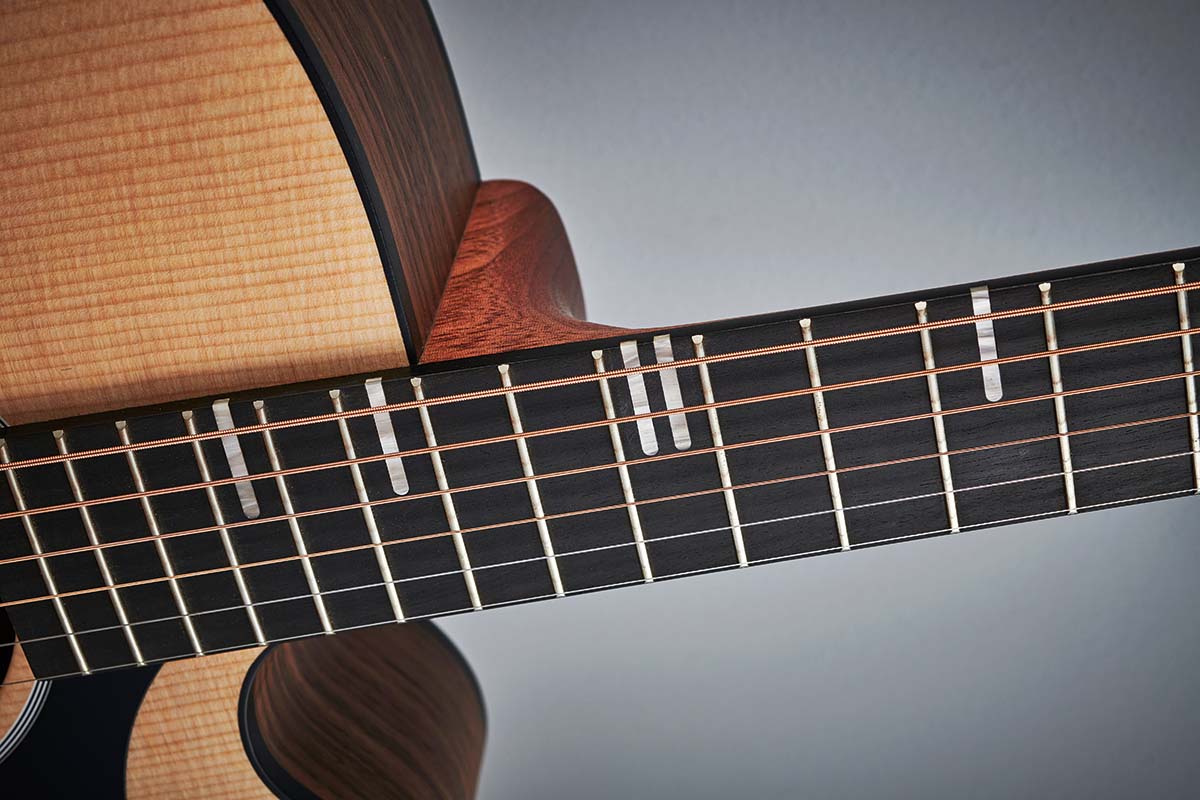
As the name suggests, the G-45 is a modern update of the J-45. This, we would imagine, was closest to Ted McCarty’s original vision for a Player Port, though the blueprints suggest this ancillary soundhole would have been positioned differently.
Both the G-45 and G-00 have dot inlays on the fingerboards, while the G-200 EC and G-Writer EC have ‘single bar’ position markers. The G-200 EC is recognisably a jumbo, while the G-Writer is proportioned similarly to the less famous Songwriter model – presently found in the Original series, complete with ‘moustache’ bridge and split parallelogram inlays – but with a cutaway.
These acoustic-electric models are fitted with LR Baggs Element Bronze pickup system, which is controlled by the most minimalist of preamps. Okay, so it’s only got a single volume control to its name, but it is discrete, mounted out of the way in the soundhole. After all, where else could it go? The shoulder’s real estate is given over to that plastic-rimmed Player Port. And that brings us to a pertinent question: does the Player Port make a difference?
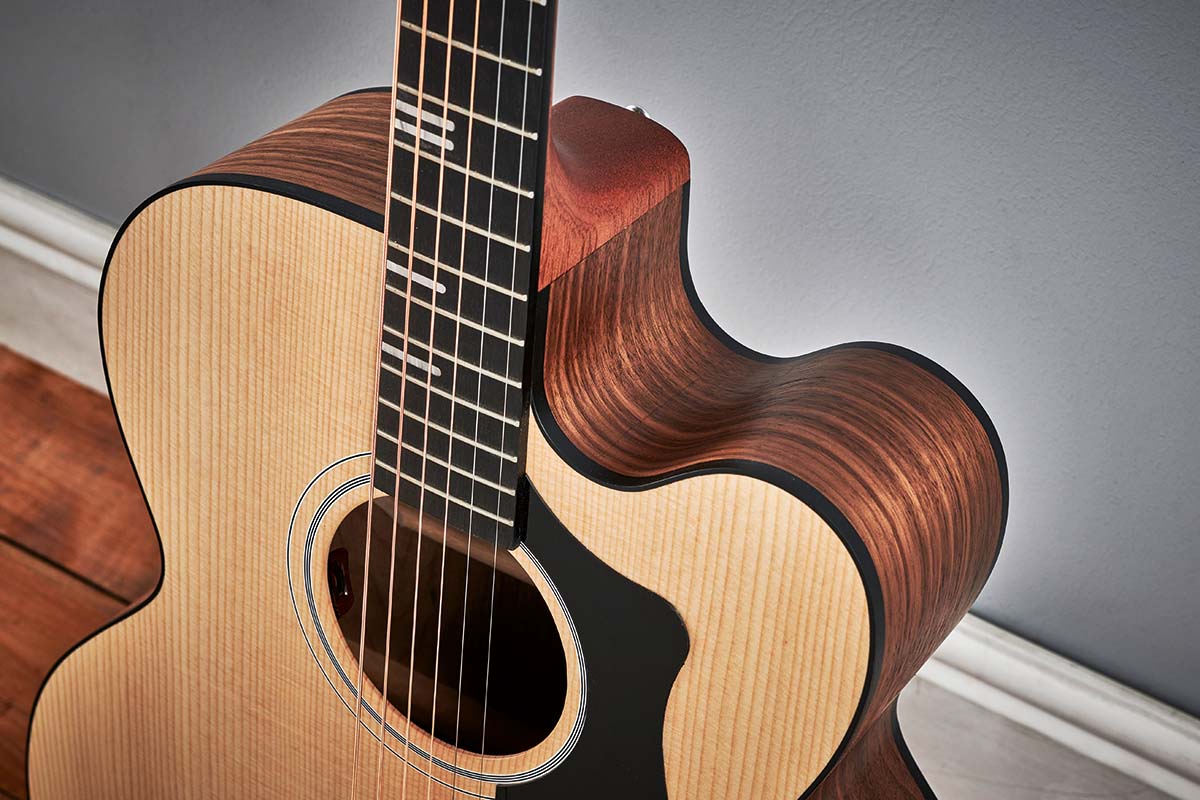
Gibson Generation Collection: Performance and verdict
The Player Port is sure to remain a big talking point but only among guitar players and probably only until you actually play the instrument. On each of these Generation Collection acoustics, there’s not a discernible difference in the projected sound from an audience POV. But for the player, it gives you more direct feedback of your sound; which could be useful when playing in a noisy environment, perhaps in a band mix where you don’t have the luxury of a wedge monitor.
Sure, we can’t recall ever picking up a Hummingbird and thinking it was hiding any of its tone from us – or being tempted to retro-fit a Player Port – but it’s certainly no gimmick.
As for the guitars, well, these are supremely attractive and welcoming instruments. The g-00, effectively the baby of the bunch, is a grown-up acoustic with an excellent factory setup and a form that sits nicely on the lap.
Travel guitar? Well, it’s one of those compact acoustics that you’ll tend to take everywhere in the house with you and has a voice that will record well. There’s enough oomph to do the bass notes justice and plenty of sweet treble and clarity.
The G-00’s volume is impressive but it’s naturally going to be outgunned in those stakes by the G-45. And for a modern workhorse acoustic, this has everything you could want – except a pickup, which seems a shame. It’s a supremely well-executed update of Gibson’s classic slope-shouldered dread’, a beast for thumping out big open chords, but with a well-balanced frequency profile that gives each note a fair shake.
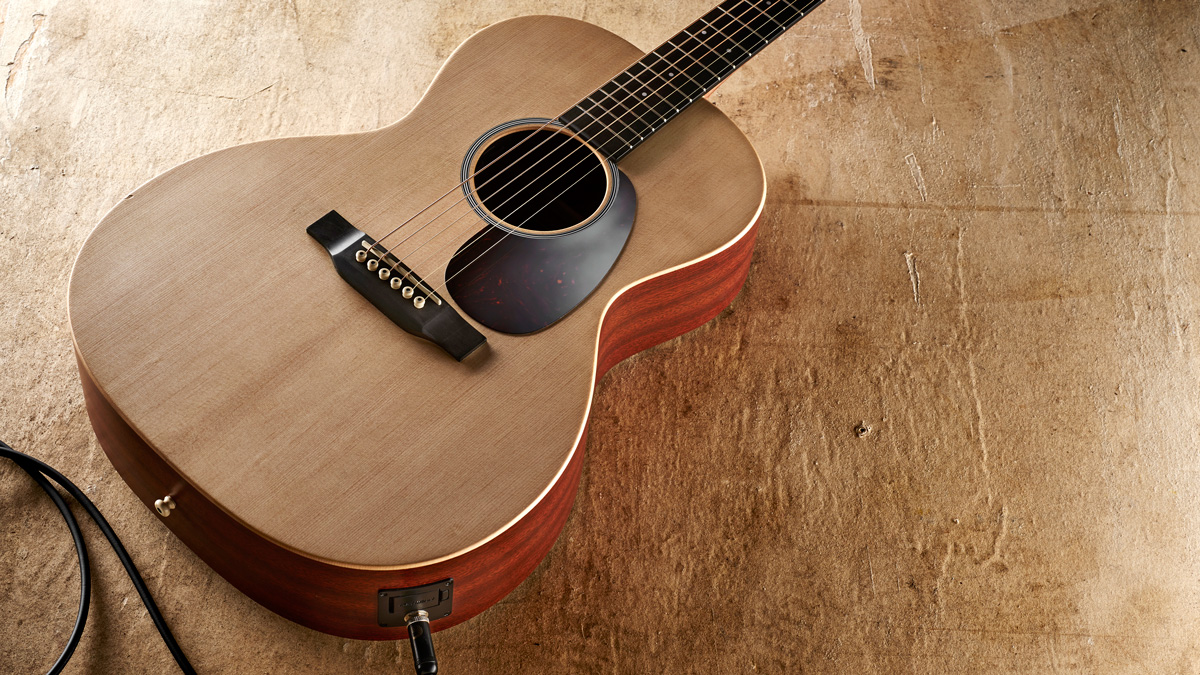
• Martin 00LX1AE
This guitar is a reminder not to come to hasty conclusions based on spec alone; you really need to play the guitar to know if it’s going to light your wick - and here’s a little chap we suggest you add to your ‘must-try’ shortlist.
• Yamaha A5R ARE
An electro experience that captures the sound of an unplugged acoustic? The SRT2 is one of the closest to get there yet, an update that marks the A Series out as an essential consideration for players who rely on a consistent and controllable stage sound.
• Guild M-40E
With a wide neck and ample string spacing, the M-40E is a guitar that responds well to more muscular playing - whether that be chord work or strong fingerpickers from the Nick Drake school of folk finesse.
With so many appointments shared by each guitar in the series, there’s a sense of familiarity by the time we arrive at the G-Writer. The bar inlays might divide opinion – the dot inlay does a good job on the G-00 and G-45 – but otherwise, the house style for the Generation Collection is maintained, and in no way compromised by the preamp controls, which, like the Player Port, is the sort of thing that only the player will notice.
The LR Baggs Bronze system deploys an under-saddle pickup that’s designed to minimise that plasticky quack that so often plagues cheap transducer designs and it makes the G-Writer an eminently giggable acoustic. The minimalist preamp controls – remember, just a single volume control – might require some outboard EQ options but as it is, its voice is warm, big, detailed and pro.
If the Generation Collection’s great triumph lies in updating classic designs and pricing them competitively, then arguably, the G-200 steals the show with its big-bodied sounds. On paper, the G-200’s dimensions make it seem at odds with the au courant demand for small-bodied playability, portability and all that sort of thing, but it is a great instrument to play, with all the three-dimensional projection of the best jumbos, and of course with the no-fuss LR Baggs electrics.
Whether there is a pick of the litter here is a difficult question to answer. The G-200’s majestic sound and comfortable ride make it hard to look past, especially at this price. But then portability is in, and when you have a little acoustic guitar like the G-00 delivering that sort of performance, with a respectable amount of volume… And the warmth and stage-readiness of the G-Writer. Best try them all and see which fits best.
MusicRadar verdict: The Gibson Generation Collection’s clean designs, great tones and playability make for a compelling range of forward-thinking instruments that make US-built acoustics more affordable than ever.
Gibson Generation Collection: The web says
“The LR Baggs pickups? They are unobtrusive and businesslike, transferring the G-Writer’s and G-200’s sounds into our AER Compact 60 amp with no bother at all. But more to the point, do those player ports – the principal reason we’re here, after all – have an effect on the sound of these guitars?
“To be honest, it’s incredibly difficult to tell. All four instruments have an open airiness to them with great definition and clarity and, especially in the case of the little G-00, bags of volume.”
Guitarist
“Our first open chords in standard tuning are something of a revelation. It would not be unfair to expect a freshly minted small-body guitar to have a pronounced boxy character but the G-00 is surprisingly breathy with a lively shimmer.
“Swapping over to the G-45 we are immediately struck by the fact that, no matter how much you mess with it the vintage formula, this guitar still sounds like a J-45. Everything we have grown to love about the voice of the classic slope-shoulder design is present and correct in this guitar, from the woody trebles to the slightly smeared bass response.”
Guitar
Gibson Generation Collection: Hands-on demos
Guitar World
PMTVUK
Premier Guitar
Andertons
Gibson Generation Collection: Specifications
Gibson Generation G-00
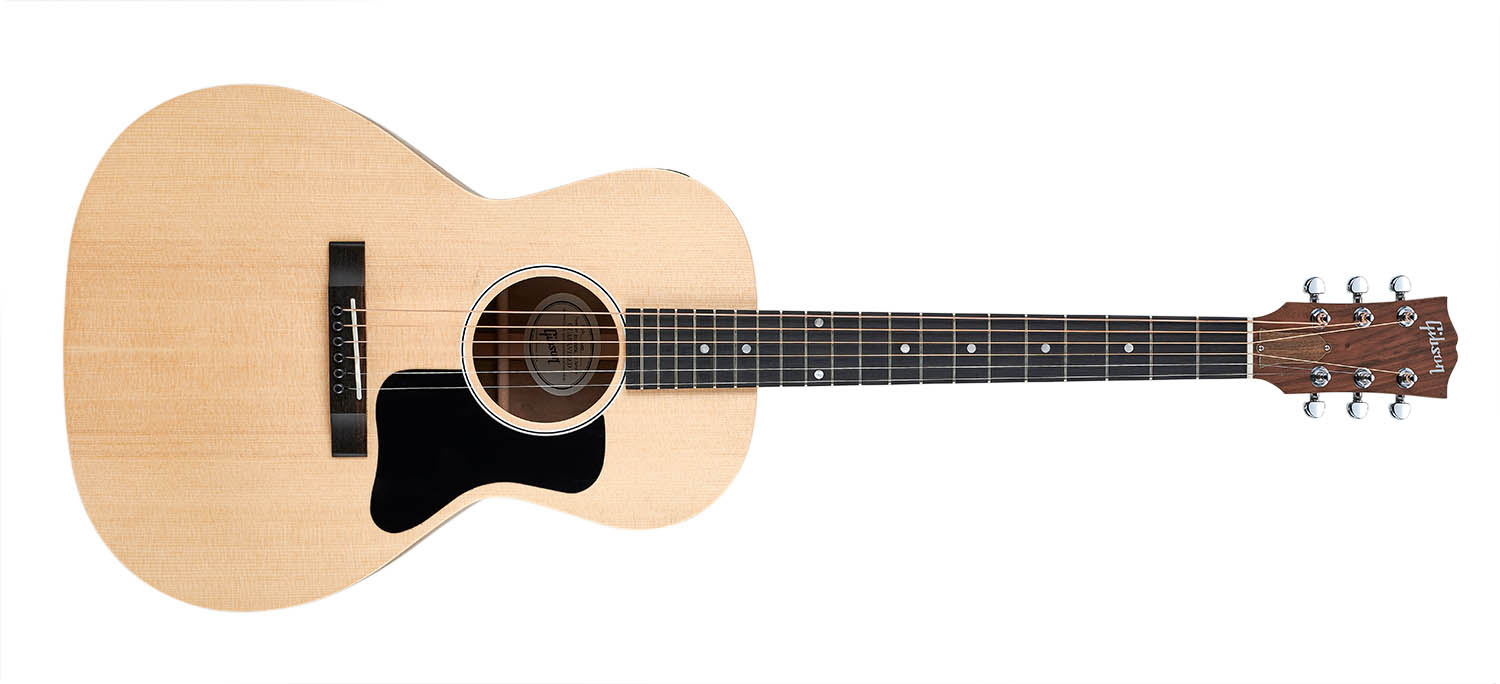
- PRICE: £899 / €909 / $999 (inc gigbag)
- ORIGIN: USA
- TYPE: Parlour/L-00 acoustic
- TOP: Sitka spruce
- BACK/SIDES: Walnut
- MAX RIM DEPTH: 104mm
- MAX BODY WIDTH: 373mm
- NECK: Utile
- SCALE LENGTH: 628mm (24.75”)
- TUNERS: Grover Mini Rotomatic
- NUT/WIDTH: Tusq/44mm
- FINGERBOARD: Ebony
- FRETS: 20 Bridge/Spacing: Ebony/56mm
- ELECTRICS: N/A
- WEIGHT (kg/lb): 1.68/3.72
- OPTIONS: None
- RANGE OPTIONS: Gibson’s Generation Collection currently comprises the four models we have here on review
- LEFT-HANDERS: Coming soon
- FINISH: Natural gloss
Gibson Generation G-45
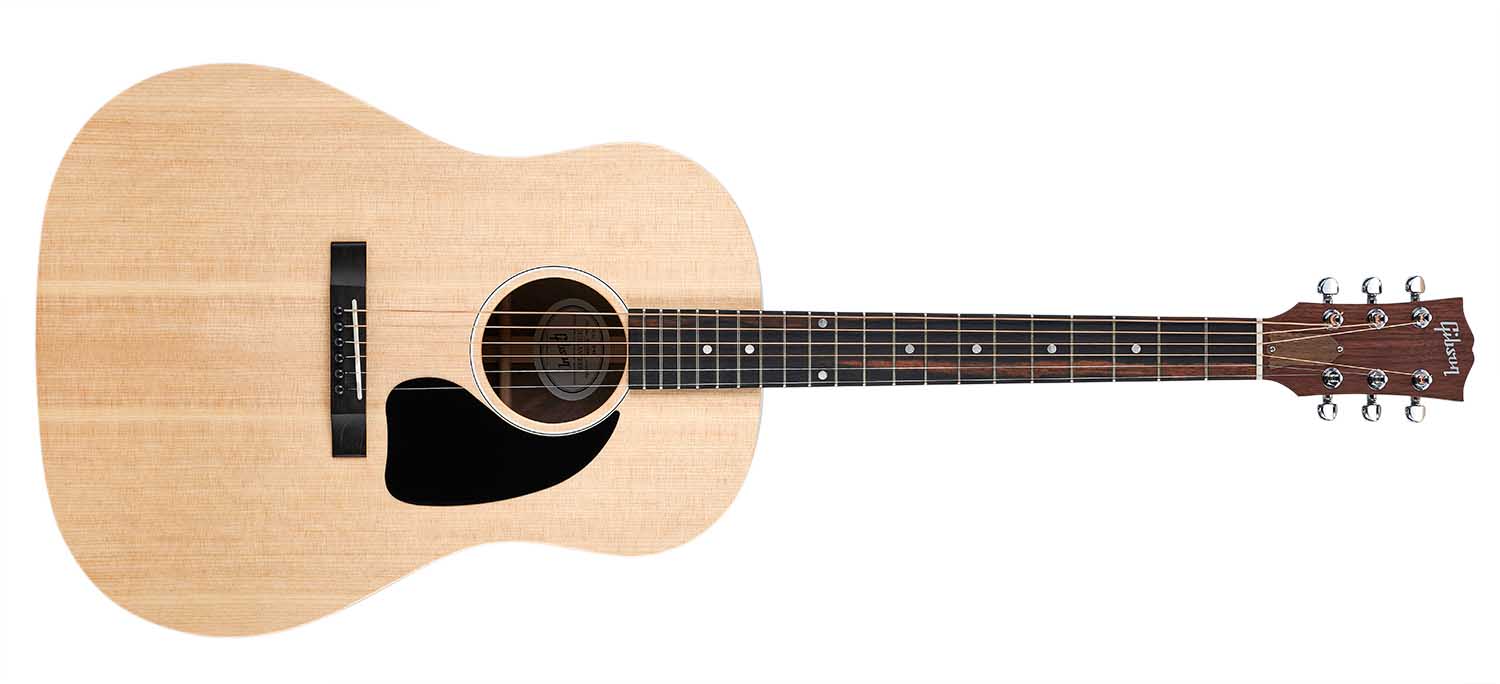
- PRICE: £1,099 / €1,088 / $1,199 (inc gigbag)
- ORIGIN: USA
- TYPE: Dreadnought (J-45) acoustic
- TOP: Sitka spruce
- BACK/SIDES: Walnut
- MAX RIM DEPTH: 103mm
- MAX BODY DEPTH: 460mm
- NECK: Utile
- SCALE LENGTH: 628mm (24.75”)
- TUNERS: Grover Mini Rotomatic
- NUT/WIDTH: Tusq/44mm
- FINGERBOARD: Ebony
- FRETS: 20
- BRIDGE/SPACING: Ebony/51mm
- ELECTRICS: N/A
- WEIGHT (kg/lb): 1.42/3.14
- LEFT-HANDERS: Coming soon
- FINISH: Natural gloss
Gibson Generation G-Writer EC
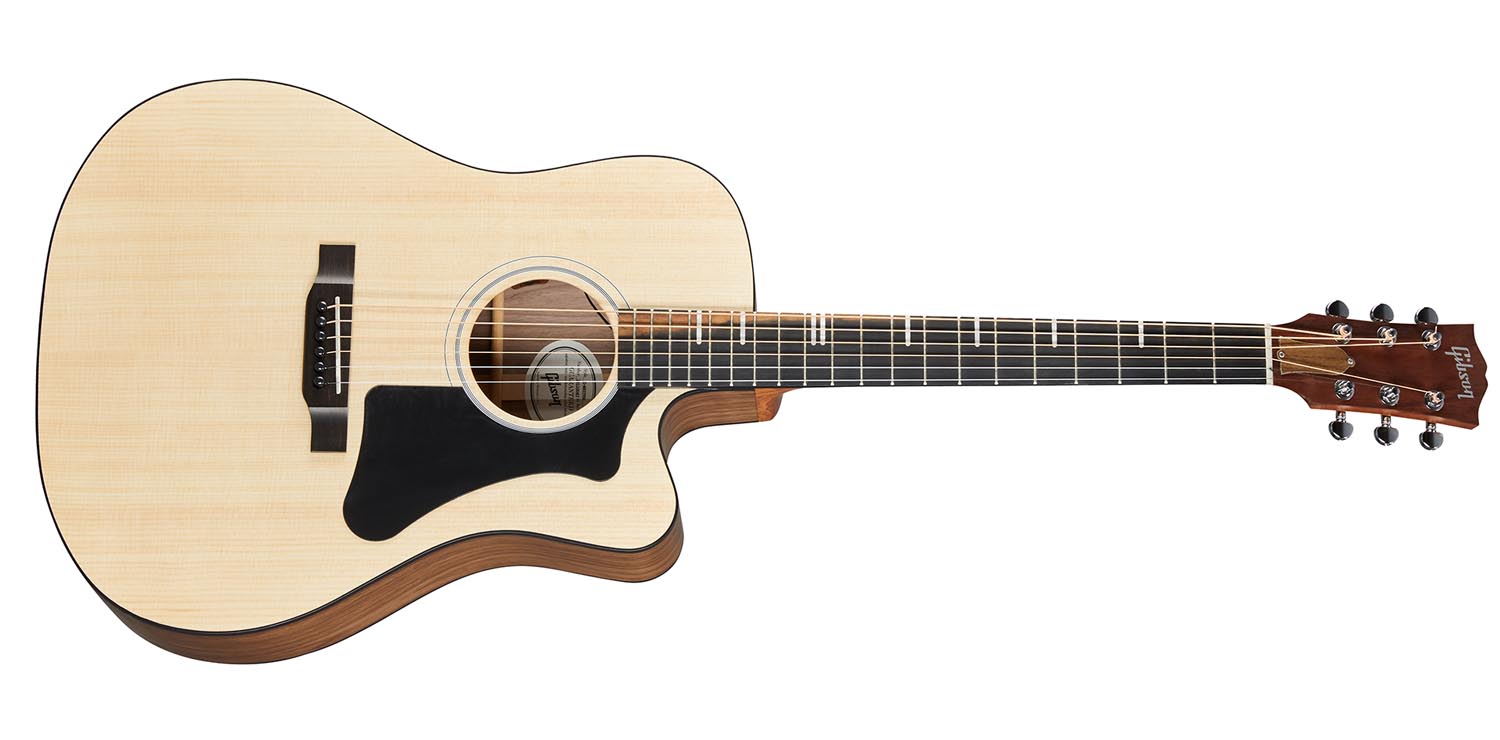
- PRICE: £1,449 / €1,545 / $1,599 (inc gigbag)
- ORIGIN: USA
- TYPE: Cutaway dreadnought (Songwriter) electro‑acoustic
- TOP: Sitka spruce
- BACK/SIDES: Walnut
- MAX RIM DEPTH: 102mm
- MAX BODY DEPTH: 407mm
- NECK: Utile
- SCALE LENGTH: 648mm (24.75”)
- TUNERS: Grover Mini Rotomatic
- NUT/WIDTH: Tusq/44mm
- FINGERBOARD: Ebony
- FRETS: 20
- BRIDGE/SPACING: Ebony/55mm
- ELECTRICS: LR Baggs Element Bronze
- WEIGHT (kg/lb): 2.04/4.50
- OPTIONS: None
- RANGE OPTIONS: See G-00
- LEFT-HANDERS: Coming soon
- FINISH: Natural gloss
Gibson Generation G-200 EC
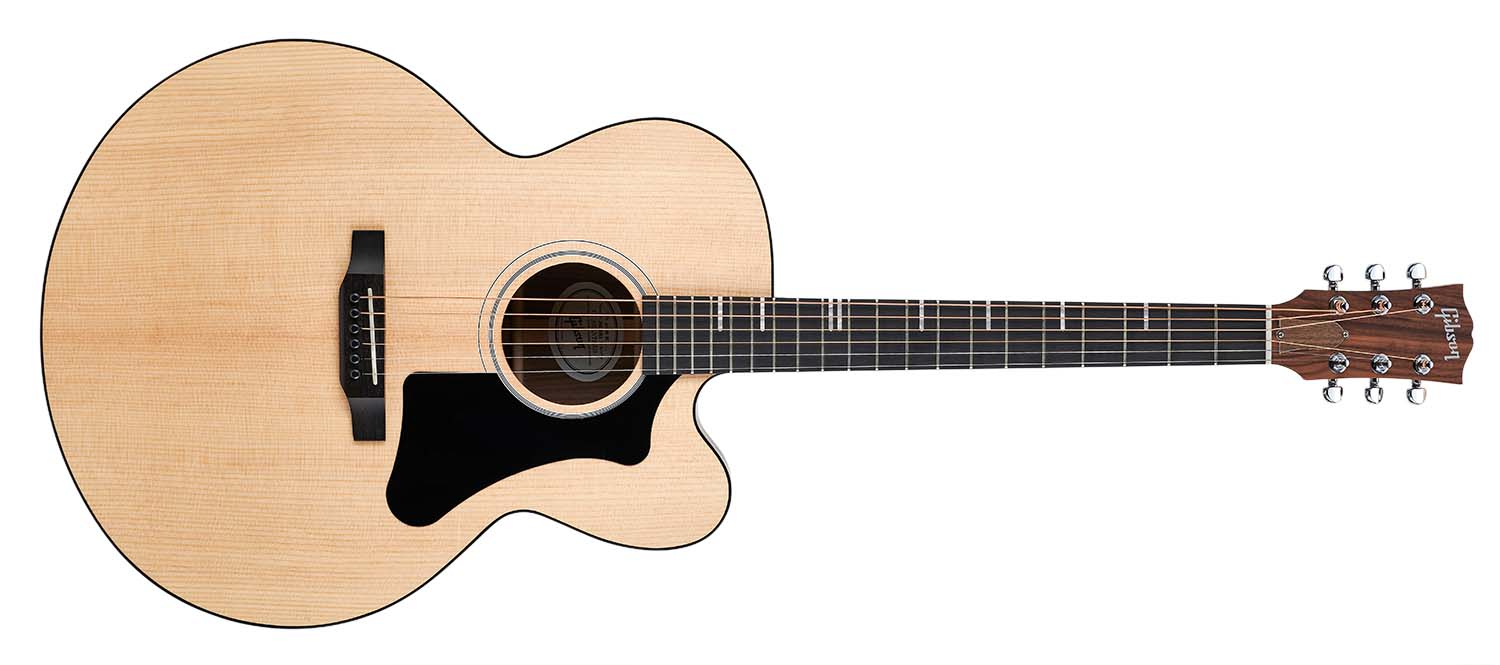
- PRICE: £1,799 / €1,990 / $1,999 (inc gigbag)
- ORIGIN: USA
- TYPE: Jumbo (J-200) electro‑acoustic
- TOP: Sitka spruce
- BACK/SIDES: Walnut
- MAX RIM DEPTH: 103mm
- MAX BODY WIDTH: 429mm
- NECK: Utile
- SCALE LENGTH: 648mm (24.75”)
- TUNERS: Grover Mini Rotomatic
- NUT/WIDTH: Tusq/44mm
- FINGERBOARD: Ebony
- FRETS: 20
- BRIDGE/SPACING: Ebony/55mm
- ELECTRICS: LR Baggs Element Bronze
- WEIGHT (kg/lb): 2.14/4.72
- OPTIONS: None
- RANGE OPTIONS: See G-00
- LEFT-HANDERS: Not as yet
- FINISH: Natural gloss
- CONTACT: Gibson
MusicRadar is the number one website for music-makers of all kinds, be they guitarists, drummers, keyboard players, DJs or producers...
- GEAR: We help musicians find the best gear with top-ranking gear round-ups and high-quality, authoritative reviews by a wide team of highly experienced experts.
- TIPS: We also provide tuition, from bite-sized tips to advanced work-outs and guidance from recognised musicians and stars.
- STARS: We talk to musicians and stars about their creative processes, and the nuts and bolts of their gear and technique. We give fans an insight into the craft of music-making that no other music website can.
"This is the amp that defined what electric guitar sounds like": Universal Audio releases its UAFX Woodrow '55 pedal as a plugin, putting an "American classic" in your DAW
"Yamaha has achieved an extraordinary level of immersiveness and realism, crafting an instrument that sounds closer to an acoustic piano and feels like one under your fingers": Yamaha Clavinova CLP-885 digital piano review
With its latest free update, Ableton has finally turned Note into the app I always wanted it to be
